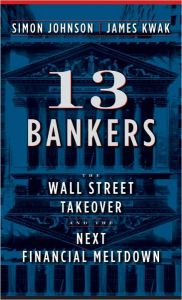Join getAbstract to access the summary!

Join getAbstract to access the summary!
Simon Johnson and James Kwak
13 Bankers
The Wall Street Takeover and the Next Financial Meltdown
Pantheon Books, 2010
What's inside?
Wall Street’s belief in lax bank rules and quick fiscal innovation pervades U.S. economic thinking – just ask the bankers.
Recommendation
This intriguing study concludes that for all the talk of a new world order after the devastating 2007-2009 financial collapse, Wall Street looks remarkably the same. Money and power are concentrated in fewer hands, but the Street’s fundamental philosophy, favoring light regulation and markets dominated by a few huge banks, survives. In this eye-opening account, former chief economist of the International Monetary Fund (IMF) Simon Johnson and former McKinsey & Co. consultant James Kwak argue that Wall Street has gotten what it wants for too long, and that the time has come to break up big banks. While the authors cover oft-trod turf, their novel premise that the government must break up the big banks counters conventional wisdom. getAbstract recommends this book to taxpayers and policy makers seeking insight into how Wall Street works.
Summary
About the Authors
Simon Johnson, who teaches at MIT’s Sloan School of Management, writes the “The Baseline Scenario” blog with former McKinsey & Co. consultant James Kwak, a software entrepreneur.






















Comment on this summary